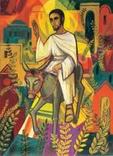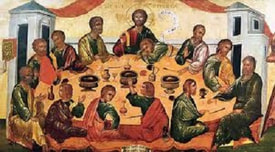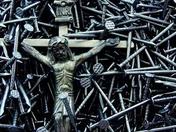Palm or Passion Sunday

All 4 Gospels (Matthew, Mark, Luke, and John) record Jesus' triumphal entry into the Holy City of Jerusalem. It was during the time of the Jewish festival of Passover, commemorating God's victorious and saving action over the death-dealing slavery of the Hebrew people in Egypt, as recorded in the book of Exodus.
On Palm Sunday, we gather to begin our entry into the story of the last week of Jesus' life. It is with some irony that we note the throngs who welcome Jesus as a conquering hero as he enters Jerusalem compared to the mob who will cry out for his blood come Friday.
On Palm Sunday, we gather to begin our entry into the story of the last week of Jesus' life. It is with some irony that we note the throngs who welcome Jesus as a conquering hero as he enters Jerusalem compared to the mob who will cry out for his blood come Friday.
- Our observation on Palm Sunday includes the "prop" of our own green palms, through which we are united with the story and our own mixed response toward Jesus in our daily lives.
- Often, our Sunday School children sing, remembering the words of the book of Psalms written generations before the narrative of Palm Sunday: "You have taught children and infants to give you praise" (Psalm 8:2).
- The narratives detailing Jesus' entry into Jerusalem note the custom of the crowds lining the way of the conquering hero with their own garments. (Think "ticker tape parade" in our own context.) Here at SSLC, we participate in the story and have it come to life in our own context by hosting a coat drive, bringing our own gently used and even new winter garments to be collected at the foot of the rough-hewn cross that stands in our sanctuary, which will be given to poverty relief agencies in our area.
- Our choir leads the "preaching" part of our worship on Palm Sunday with a sung cantata that begins to craft the meaning and significance, not just of this day, but also of the events that will transpire over the course of the week, as well.
- The service does not end with our usual dismissal of "Go in peace to love and serve the Lord." It is as if our worship is simply put on hold until we are gathered together again on Thursday evening.
Maundy Thursday

"Maundy" is probably one of the strangest words of the week's observations, having no other use in our common, every-day language. The word has to do with the word for "command," as when something is "mandated."
On this night, we remember our Lord's Last Supper with his disciples when he makes two commands. The first is that when we gather for this meal, we DO THIS IN REMEMBRANCE OF HIM (Matthew, Mark, Luke, and Paul's first letter to the Christians in Corinth). The second command--which comes from John's gospel--comes after Jesus washes the disciples feet: "DO THIS," he commands.
This night's service will be in observance of the Lord's Supper, the Holy Meal, Holy Communion, and we will be celebrating with a number of our young people as they officially receive their first communion.
The service ends on a particularly striking and somber tone: as Jesus is betrayed by one of his own; abandoned by the rest of his friends; and arrested alone in the Garden of Gethsemane--as all of his earthly support is stripped away--so too our sanctuary is stripped to its bare bones for the remainder of our worship time and in anticipation of the new life of Easter.
On this night, we remember our Lord's Last Supper with his disciples when he makes two commands. The first is that when we gather for this meal, we DO THIS IN REMEMBRANCE OF HIM (Matthew, Mark, Luke, and Paul's first letter to the Christians in Corinth). The second command--which comes from John's gospel--comes after Jesus washes the disciples feet: "DO THIS," he commands.
This night's service will be in observance of the Lord's Supper, the Holy Meal, Holy Communion, and we will be celebrating with a number of our young people as they officially receive their first communion.
The service ends on a particularly striking and somber tone: as Jesus is betrayed by one of his own; abandoned by the rest of his friends; and arrested alone in the Garden of Gethsemane--as all of his earthly support is stripped away--so too our sanctuary is stripped to its bare bones for the remainder of our worship time and in anticipation of the new life of Easter.
Good Friday

A somber and meditative service, the Good Friday Service of Shadows, also called a "Tenebrae Service," marks the final hours of Jesus' life leading up to his death on the cross.
The service is structured around the passion narrative (this year from the Gospel of Matthew), a hymn, and a tolling of the bell. There are particular parts read by individuals--Jesus, the Roman Governor Pontius Pilate, etc.--but the congregation plays the part of the crowds, the people, and the disciples. After each reading, a candle is extinguished--as Jesus moves closer to the cross, and a bell is tolled. The service ends in utter darkness.
The service is structured around the passion narrative (this year from the Gospel of Matthew), a hymn, and a tolling of the bell. There are particular parts read by individuals--Jesus, the Roman Governor Pontius Pilate, etc.--but the congregation plays the part of the crowds, the people, and the disciples. After each reading, a candle is extinguished--as Jesus moves closer to the cross, and a bell is tolled. The service ends in utter darkness.